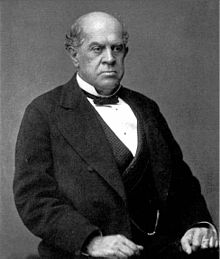

President of Argentina
February 15, 1811 San Juan, Argentina
September 11, 1888(1888-09-11) (77) Asunción, Paraguay
October 12, 1868 – October 11, 1874
19th-century President of Argentina Domingo F. SarmientoSarmiento in 1874President of ArgentinaIn office October 12, 1868 – October 11, 1874Vice President Adolfo AlsinaPreceded by Bartolomé MitreSucceeded by Nicolás AvellanedaMinister of Foreign Affairs and WorshipIn office September 6, 1879 – October 9, 1879PresidentNicolás AvellanedaPreceded by Manuel Montes de OcaSucceeded by Lucas GonzálezMinister of the InteriorIn office August 29, 1879 – October 9, 1879PresidentNicolás AvellanedaPreceded by Bernardo de IrigoyenSucceeded by Benjamín ZorrillaGovernor of San JuanIn office January 3, 1862 – April 9, 1864Preceded by Francisco DíazSucceeded by Santiago Lloveras Personal detailsBornFebruary 15, 1811 San Juan, ArgentinaDiedSeptember 11, 1888(1888-09-11) (aged 77) Asunción, ParaguayNationalityArgentinePolitical partyLiberalSpouse(s)Benita Martínez Pastoriza (m. 1847–1857); separated Domestic partnerAurelia Vélez Sársfield (1857–1888); his death ChildrenAna Faustina Domingo FidelSignatureMilitary serviceAllegiance ArgentinaBranch/service Argentine ArmyYears of service1834–1863Rank Divisional General Domingo Faustino Sarmiento Influences Generation of '37, The Federalist, Babeuf, Bello, Buret, Chevalier, Condorcet, Constant, Cousin, Damiron, Enfantin, Fourier, Guizot, Jouffroy, Lerminier, Leroux, Locke, Mann, Mill, Montesquieu, Owen, Peabody Mann, Reynaud, Rousseau, Saint-Simon, Tacitus, Tocqueville, Volney Influenced Generation of '37, Generation of '80, Asturias, Bello, Borges, Bunge, Darío, Groussac, Henríquez Ureña, Ingenieros, Lugones, Martínez Estrada, Menéndez Pelayo, Mistral, Peabody Mann, Sebreli, Unamuno, Vargas Llosa Domingo Faustino Sarmiento (February 15, 1811 – September 11, 1888) was an Argentine activist, intellectual, writer, statesman and the seventh President of Argentina. His writing spanned a wide range of genres and topics, from journalism to autobiography, to political philosophy and history. He was a member of a group of intellectuals, known as the Generation of 1837, who had a great influence on 19th-century Argentina. He was particularly concerned with educational issues and was also an important influence on the region's literature. Sarmiento grew up in a poor but politically active family that paved the way for many of his future accomplishments. Between 1843 and 1850 he was frequently in exile, and wrote in both Chile and in Argentina. His greatest literary achievement was Facundo, a critique of Juan Manuel de Rosas, that Sarmiento wrote while working for the newspaper El Progreso during his exile in Chile. The book brought him far more than just literary recognition; he expended his efforts and energy on the war against dictatorships, specifically that of Rosas, and contrasted enlightened Europe—a world where, in his eyes, democracy, social services, and intelligent thought were valued—with the barbarism of the gaucho and especially the caudillo, the ruthless strongmen of nineteenth-century Argentina. While president of Argentina from 1868 to 1874, Sarmiento championed intelligent thought—including education for children and women—and democracy for Latin America. He also took advantage of the opportunity to modernize and develop train systems, a postal system, and a comprehensive education system. He spent many years in ministerial roles on the federal and state levels where he travelled abroad and examined other education systems. Sarmiento died in Asunción, Paraguay, at the age of 77 from a heart attack. He was buried in Buenos Aires. Today, he is respected as a political innovator and writer. Miguel de Unamuno considered him among the greatest writers of Castilian prose.

We use cookies
We use cookies and other tracking technologies to improve your browsing experience on our website, to show you personalized content and targeted ads, to analyze our website traffic, and to understand where our visitors are coming from. Privacy Policy.